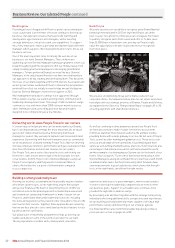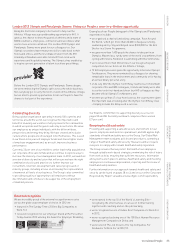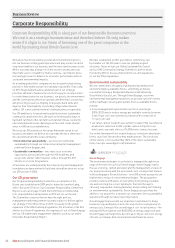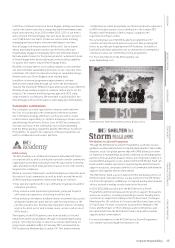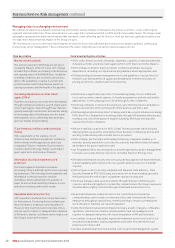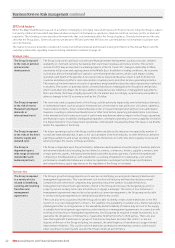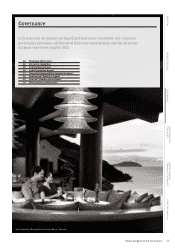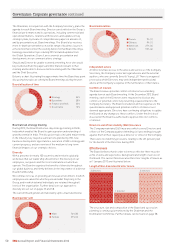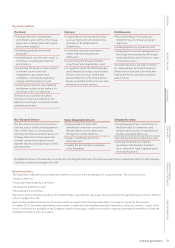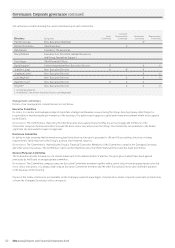Holiday Inn 2012 Annual Report Download - page 44
Download and view the complete annual report
Please find page 44 of the 2012 Holiday Inn annual report below. You can navigate through the pages in the report by either clicking on the pages listed below, or by using the keyword search tool below to find specific information within the annual report.
42 IHG Annual Report and Financial Statements 2012
2013 risk factors
Whilst the Major Risk Review focussed on a number of changing or emerging risks which represent the priorities for today, the Group is subject
to a variety of inherent risks which may have an adverse impact on the business operations, financial condition, turnover, profits, brands and
reputation. The following section describes the main risks that could materially affect the Group’s business. The risks below are not the only
ones that the Group faces. Some risks are not yet known to IHG and some that IHG does not currently believe to be material could later turn
out to be material.
The risk factors below should be considered in connection with any financial and forward-looking information in this Annual Report and the
cautionary statements regarding forward-looking statements contained on page 141.
Strategic risks
The Group is exposed
to the risks of political
and economic
developments
The Group is exposed to political, economic and financial market developments such as recession, inflation,
availability of credit and currency fluctuations that could lower revenues and reduce income. The current
outlook for 2013 may worsen due to escalating impacts of the US ‘fiscal cliff’, change in leadership in China,
uncertainty in Eurozone and ongoing unrest in the Middle East. In addition to trading conditions, the economic
outlook also affects the availability of capital to current and potential owners, which could impact existing
operations and health of the pipeline. A recession reduces leisure and business travel to and from affected
countries and adversely affects room rates and/or occupancy levels and other income-generating activities.
This may result in deterioration of results of operations and potentially reduce the value of properties in affected
economies. The owners or potential owners of hotels franchised or managed by the Group face similar risks
which could adversely impact the Group’s ability to retain and secure franchise or management agreements.
More specifically, the Group is highly exposed to the US market and, accordingly, is particularly susceptible to
adverse changes in the US economy as well as the US dollar.
The Group is exposed
to the risk of events
that adversely impact
domestic or
international travel
The room rates and occupancy levels of the Group could be adversely impacted by events that reduce domestic
or international travel, such as actual or threatened acts of terrorism or war, political or civil unrest, epidemics,
travel-related accidents, travel-related industrial action, increased transportation and fuel costs and natural
disasters, resulting in reduced worldwide travel or other local factors impacting individual hotels. A decrease
in the demand for hotel rooms as a result of such events may have an adverse impact on the Group’s operations
and financial results. In addition, inadequate preparation, contingency planning or recovery capability in relation
to a major incident or crisis may prevent operational continuity and consequently impact the value of our brands
and/or the reputation of the Group.
The Group is exposed
to the risks of the hotel
industry supply and
demand cycle
The future operating results of the Group could be adversely affected by industry overcapacity (by number of
rooms) and weak demand due, in part, to the cyclical nature of the hotel industry, or other differences between
planning assumptions and actual operating conditions. Reductions in room rates and occupancy levels would
adversely impact the results of Group operations.
The Group is
dependent upon a
wide range of external
stakeholders and
business partners
The Group is dependent upon the performance, behaviours and reputation of a wide range of business partners
and external stakeholders including, but not limited to, owners, contractors, lenders, suppliers, vendors, joint
venture partners, agents, third party intermediaries and other business partners. Further, the number and
complexity of interdependencies with stakeholders is evolving. Breakdown in relationships, poor vendor
performance, stakeholder behaviours or adverse reputations could impact on the Group’s performance
and competitiveness, guest experiences or the reputation of the Group or its brands.
Tactical risks
The Group is exposed
to a variety of risks
related to identifying,
securing and retaining
franchise and
management
agreements
The Group’s growth strategy depends on its success in identifying, securing and retaining franchise and
management agreements. This is an inherent risk for the hotel industry and franchise business model.
Competition with other hotel companies may generally reduce the number of suitable franchise,
management and investment opportunities offered to the Group and increase the bargaining position of
property owners seeking to become a franchisee or engage a manager. The terms of new franchise or
management agreements may not be as favourable as current arrangements; the Group may not be able
to renew existing arrangements on similarly favourable terms or at all.
There can also be no assurance that the Group will be able to identify, retain or add franchisees to the IHG
System or to secure management contracts. For example, the availability of suitable sites, market saturation,
planning and other local regulations or the availability and affordability of finance may all restrict the supply
of suitable hotel development opportunities under franchise or management agreements. In connection with
entering into franchise or management agreements, the Group may be required to make investments in, or
guarantee the obligations of, third parties or guarantee minimum income to third parties. There are also
risks that significant franchisees or groups of franchisees may have interests that conflict, or are not
aligned, with those of the Group including, for example, the unwillingness of franchisees to support brand
improvement initiatives. This could result in franchisees prematurely terminating contracts which would
adversely impact overall System size and the Group’s financial performance.
Business Review: Risk management continued


